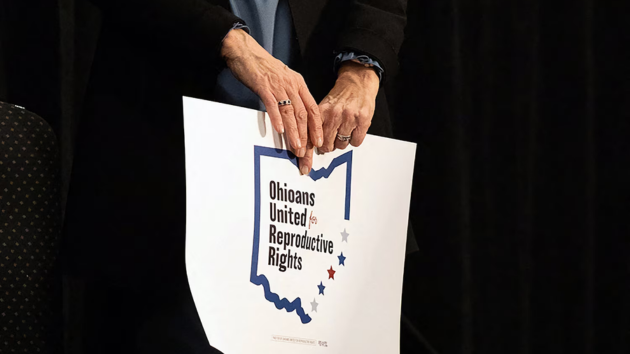
(OHIO) — Republican lawmakers in Ohio are planning on introducing a bill on Wednesday that would ban almost all abortions and criminalize the procedure.
The “Ohio Prenatal Equal Protection Act” would overturn the amendment to the Ohio constitution, voted on in 2023, that establishes “an individual right to one’s own reproductive medical treatment, including but not limited to abortion” before viability.
Reproductive medical treatment includes contraception, fertility treatments and miscarriage care.
Abortions are currently allowed up to 20 weeks since fertilization, according to the Guttmacher Institute, a research group that studies sexual and reproductive rights.
“[It] is a very, very simple and beautiful piece of legislation in that all it does is identify all human beings as persons deserving equal protection of the law, both born humans and pre-born humans,” anti-abortion advocate Austin Beigel, with End Abortion Ohio, told ABC News. “So, it identifies those personhood rights starting at the moment of fertilization, when the new distinct organism is formed, the new human life that being that person now has equal protection under the law.”
Kellie Copeland, executive director of Abortion Forward, which helped pass the 2023 amendment in Ohio, said the bill goes against the will of voters.
“This is the most extreme and anti-life legislation that you can imagine,” she told ABC News. “It would strip Ohioans of their constitutionally guaranteed right to bodily autonomy, and that’s the goal of this legislation.”
When Beigel was asked if he was concerned that the bill may go against the will of the voters, he said he was not because “the will of the voters was evil.”
“In many times in our country’s history, the majority of people have desired evil things. We have discriminated horribly against the Black man and woman, and people wanted that,” he continued. “So, I have no qualms about saying I oppose the majority of the will of the people when the people desire something that is evil.”
Copeland replied that “subjecting people to the loss of bodily autonomy, taking basic human rights away from Ohioans is the real evil that we’re talking about here.”
Beigel said he has been working with Republican state Reps. Levi Dean and Jonathan Newman on the bill, which uses the U.S. Constitution’s equal protection clause — part of the Fourteenth Amendment — to override Ohio’s constitutional amendment. Beigel said the co-sponsors will be announced on Wednesday.
Dean’s and Newman’s offices did not immediately return ABC News’ request for comment.
The bill would ban abortion with no exceptions for rape or incest. The only exceptions would be for a spontaneous miscarriage or to save the life of the pregnant woman.
The bill would also criminalize those who have abortions, not just the providers who perform the procedure.
Copeland she is worried the bill could lead to attacks on people who support abortion rights or who underwent abortions.
“When people equate reproductive health care with murder, that kind of rhetoric invites violence,” Copeland said. “It invites violence that we have seen at abortion clinics that we have seen perpetrated against abortion providers.”
Beigel said the bill does not outlaw contraception and is not designed to outlaw in-vitro fertilization (IVF).
However, he did say that IVF may not be able to function the way that it does now if the bill is passed because it would apply equal protection to “pre-born humans.”
“The courts are going to have to debate the implications of this,” he said. “Is it actually moral to freeze a young human being in a cryochamber and preserve them at the age they are and not let them grow?”
Ohio’s history of abortion bills
In 2019, Ohio lawmakers passed a so-called heartbeat bill that bans abortions after cardiac activity can be detected, which occurs as early as six weeks of pregnancy, before many women know they’re pregnant. It was signed into law by Gov. Mike DeWine.
The ban had no exceptions for rape or incest. The only exceptions were cases of ectopic pregnancies and to prevent the mother’s death or impairment of a major bodily function.
A federal judge blocked the ban in 2019, but it was reinstated just hours after the Supreme Court decision to overrule Roe v. Wade.
In September 2022, an Ohio lower court granted a temporary restraining order before granting a preliminary injunction a few weeks later. In December 2023, the state’s Supreme Court dismissed the state’s appeal and sent the case back to the lower courts.
In November 2023, 57% of voters approved the passing of the amendment, adding abortion protections to the state constitution.
Much of the six-week ban was rendered unconstitutional after the amendment went into effect in December 2023, Ohio’s Attorney General Dave Yost said earlier this year.
However, some lawmakers have tried to maintain other parts of the ban, including reporting requirements and a 24-hour waiting period before an abortion can be administered. An Ohio judge temporarily blocked the 24-hour waiting period in August 2024.
Copyright © 2025, ABC Audio. All rights reserved.



